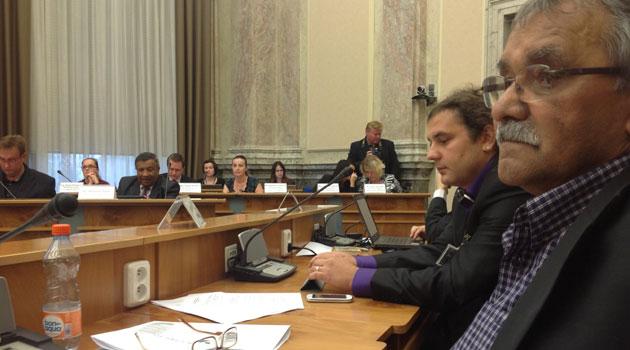Czech Gov't Roma Commission: Municipal consent to housing benefits must be abolished

The Czech Government Inter-ministerial Commission on Roma Community Affairs, which is chaired by Czech Minister for Human Rights, Equal Opportunities and Legislation Jiří Dienstbier, convened last week and joined those institutions and politicians demanding a new amendment to the law on aid to those in material distress. As of May, local municipalities, not Labor Offices, have been empowered to decide whether housing benefits applications should be awarded.
According to Czech Labor and Social Affairs Minister Michaela Marksová, the recent change to the law on aid to those in material distress was intended to to give municipalities regulatory power over residential hotels. Some municipalities have now used that power to reject housing benefit applications across the board or established criteria for their being awarded that most people that can never meet.
The Czech Government Agency for Social Inclusion estimates that the number of persons who might end up on the street as a result of losing their benefits is 17 000, while the Platform for Social Inclusion estimates it at 25 000. At last week’s session, the Czech Government Interministerial Commission on Roma Community Affairs recommended the Government task the Czech Labor and Social Affairs Minister with submitting, by 15 August, yet another amendment to the law on aid to those in material distress abolishing the condition of municipal consent for the awarding of housing benefits.
The Commission joined other backers of a new amendment such as Czech Prime Minister Bohuslav Sobotka, Czech Human Rights Minister Jiří Dienstbier, Czech Interior Minister Milan Chovanec and Czech ombud Anna Šabatová. Marksová, however, is insisting that the state must reach agreement on any new amendment with municipalities and has said she believes the paragraph on municipal consent should remain in place.
The Roma Commission also approved its programs for Supporting Fieldwork, Community Work Preventing Social Exclusion, and Support for Roma Affairs Coordinators. The Roma Commission also discussed and took under advisement the prepared priorities for the Crime Prevention Strategy in relation to socially excluded localities, for example, the financing and job descriptions of crime prevention assistants.
Another item on the agenda was closely related to that issue, that of the approach taken by the Czech Police toward members of national minorities, Roma in particular, and the work of the Czech Police in socially excluded localities. Members of the Roma Commission were also officially introduced to the new director of the Department for Social Inclusion at the Office of the Government of the Czech Republic (the Agency for Social Inclusion), Radek Jiránek, and informed as to the current activity of the Agency and his intentions as head of the department.